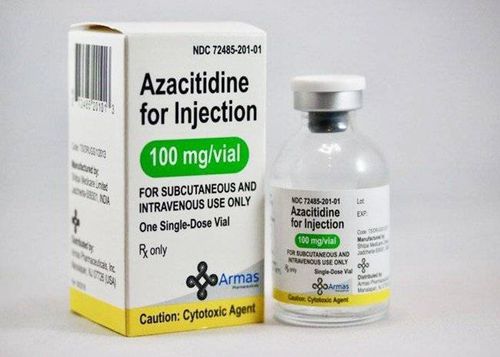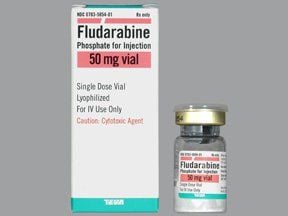This is an automatically translated article.
Daunorubicin drug is made in the form of powder for injection, solution for injection or liposomal injection. Daunorubicin is a drug that is used to treat acute leukemia.
1. Uses of Daunorubicin
What is Daunorubicin? Daunorubicin contains Daunorubicin as the main ingredient. This ingredient is an anthracycline glycoside derivative with anti-cancer effects. Daunorubicin has the strongest effect on the S phase of the cell division. The anti-cancer mechanism of Daunorubicin is to bind to the interleaved DNA between base pairs, inhibit RNA and DNA synthesis, disrupt replication patterns, and prevent cell replication. In addition, Daunorubicin has antibacterial and immunosuppressive effects. Indications for use of Daunorubicin:Treatment of acute myeloid and lymphoid leukemia; Used in combination regimens for the treatment of acute myeloid and lymphocytic leukemia in children; Treatment of acute myeloid leukemia; Liposomal microparticle daunorubicin is the first-line treatment of Kaposi's sarcoma in patients with advanced AIDS. Daunorubicin drugs are not allowed to be prescribed in the following cases:
Patients with hypersensitivity to Daunorubicin and other components of the drug; Patients with persistent myelosuppression; Patients with severe infections; New/current person with shingles or chickenpox; Patients with recent myocardial infarction, heart failure or severe arrhythmia; People with severely impaired liver and kidney function; Daunorubicin should not be administered intramuscularly or subcutaneously.
2. Dosage and how to take Daunorubicin
Daunorubicin is very irritating to tissues, so it should only be used intravenously.
2.1 In adults The dose of Daunorubicin solution for injection should be based on the clinical response, side effects on the hematopoietic system, the patient's tolerance to the drug, and whether chemotherapy or radiation therapy is concurrent or not. . The purpose of this is to help optimize treatment outcomes and reduce drug side effects.
Usual dose: Use a dose of 40 - 60mg/m2/day, a normal course of treatment includes 3 injections; Acute myeloid leukemia: People under 60 years old use 45mg/m2/day (people over 60 years old use 30mg/m2/day) for 3 consecutive days in the first cycle, for 2 consecutive days of the cycles. next program. Up to 3 new cycles of treatment may be required for a satisfactory response; Acute Lymphocytic Leukemia: Induction therapy is 45mg/m2/day for 3 consecutive days. Consolidation therapy can be performed after disease remission with induction therapy. The total cumulative therapeutic dose should not exceed 55 mg/m2 (because of the risk of cardiotoxicity) and should not exceed 400 mg/m2 in patients receiving radiation therapy; Kaposi's sarcoma in patients with advanced AIDS: Administer the liposomal form of Daunorubicin citrate by 1:1 dilution with 5% dextrose injection solution (do not use 0.9% sodium chloride solution or bacteriostatic agents such as benzylic alcohol or other solutions) to obtain a solution of 1 mg/ml, by slow intravenous infusion over 60 minutes. The usual dose in adults is 40 mg/m2 once every 2 weeks until the disease is controlled. 2.2 In other subjects Children: Usually a dose of 25mg/m2 is used on the first day of the treatment week. Good results are usually assessed after 4 courses of treatment. If after 4 sessions it is not cured, you can use the drug 1-2 more times. For children under 2 years old or with skin area less than 0.5m2, the dose is 1mg/kg/day. The total dose in children over 2 years old should not exceed 300mg/m2, children under 2 years old should not exceed 10mg/kg; Elderly: Daunorubicin should be used with caution in patients with insufficient bone marrow reserves due to old age, the dose should be reduced to 50%; Patients with liver failure: If the patient has bilirubin from 1.2 to 3mg/dl, use 75% of the usual dose, if bilirubin is over 3mg/dl, use 50% of the usual dose; Patients with renal impairment: If the patient has serum creatinine above 3mg/dl, use 50% of the usual dose. Missed dose: If you forget to schedule your Daunorubicin injection, you should call your doctor for detailed instructions.
Overdose: Using Daunorubicin in overdose causes symptoms such as myelosuppression (agranulocytosis), nausea, vomiting, weakness and acute myocardial degeneration. Treatment is supportive therapy.
3. Daunorubicin side effects
Some side effects patients may experience when using Daunorubicin include:
Common: EKG abnormality (ST wave changes, supraventricular tachycardia, atrial or ventricular extrasystoles), anxiety, confusion, hallucinations, unsteadiness, convulsions, increased muscle tone, bone marrow depression, bone marrow suppression, leukopenia. Uncommon: Increased bilirubin, hepatitis, increased liver enzymes, anaphylactic reactions, infertility, local reactions (cellulitis, thrombophlebitis at the injection site, pain).
4. Be careful when using Daunorubicin
Some notes patients need to remember before and while using Daunorubicin:
When handling Daunorubicin hydrochloride, it is necessary to avoid contact with skin and mucous membranes. Also, caution should be exercised in contact with the patient's vomit and faeces as they may contain Daunorubicin or its active metabolites; After taking Daunorubicin hydrochloride, patients are at risk of uncontrolled infections, especially viral diseases that can develop into life-threatening exacerbations because the drug can cause immunosuppression; Daunorubicin dose should be reduced in patients receiving concomitant radiation therapy; The patient's blood count should be carefully monitored before and during treatment with Daunorubicin, with particular attention to platelets, red blood cells, white blood cells and granulocytes; HIV-infected patients should be carefully monitored for signs of opportunistic infection; Careful monitoring of cardiac function is recommended before, during, and after treatment with Daunorubicin to determine the risk of cardiac complications early, especially in previous anthracycline users, patients with heart disease or children; Use of Daunorubicin drug should be careful, make sure the drug is not extravasated to avoid causing tissue necrosis at the injection site; Patients should be informed in advance of the risk that urine may temporarily turn red; Special caution should be exercised when using Daunorubicin in patients with prior, concurrent or planned radiation therapy; The patient's liver and kidney function should be monitored prior to initiating therapy with Daunorubicin; Avoid vaccination with live vaccines in patients receiving Daunorubicin; Daunorubicin may cause nausea and vomiting, which can be prevented or mitigated by the use of appropriate antiemetic therapy. Stomach inflammation, mucositis often appears soon after taking the drug, if severe, it can progress for a few days leading to mucosal ulcers. Most patients recover from these side effects by the 3rd week of treatment; Daunorubicin should be avoided in pregnant women, especially during the first 3 months of pregnancy; Mothers need to stop breastfeeding while using Daunorubicin; Convulsions, confusion, and visual disturbances have been reported in patients treated with combination therapy with Daunorubicin. Therefore, patients should be warned about possible side effects when taking the drug, and should not drive or operate machinery if they are experiencing these symptoms.
5. Daunorubicin drug interactions
Some drug interactions of Daunorubicin include:
Combined use of Daunorubicin with drugs colchicine, allopurinol, colchicin, probenecid or sulfinpyrazone can increase uric acid levels in the blood; Concomitant use of Daunorubicin with drugs that cause blood dyscrasias may increase the leukopenia and thrombocytopenia effects of Daunorubicin; Bone marrow suppressants or radiation will increase bone marrow suppression if used concurrently or sequentially; Concomitant use of Daunorubicin with cyclophosphamide or irradiation to the mediastinum may lead to increased cardiotoxicity; The use of Daunorubicin in patients who have previously received doxorubicin may increase the risk of cardiotoxicity, so the dose should be reduced; Concomitant use of Daunorubicin with other hepatotoxic drugs (such as methotrexate) may cause toxicity; Daunorubicin hydrochloride may increase the concentration and effects of natalizumab; reduces the concentration and effect of cardiac glycosides, inactivated vaccines; Concomitant use of Daunorubicin with live viral vaccines may increase the potential for vaccine replication, increase side effects and decrease antibody response; Daunorubicin solution for injection is incompatible with dexamethasone sodium phosphate, heparin sodium and other medicinal solutions (precipitation or discoloration); Incompatibility for infusion of Daunorubicin Y-branch with allopurinol sodium, fludarabine phosphate, aztreonam, piperacillin sodium - tazobactam sodium. When using Daunorubicin, the patient should follow all instructions given by the doctor. This will ensure effective treatment and reduce the risk of unexpected side effects or problems.
Please dial HOTLINE for more information or register for an appointment HERE. Download MyVinmec app to make appointments faster and to manage your bookings easily.













